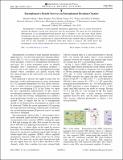Entanglement’s Benefit Survives an Entanglement-Breaking Channel
Author(s)
Zhang, Zheshen; Tengner, Maria; Zhong, Tian; Wong, Franco N. C.; Shapiro, Jeffrey H.
DownloadZhang-2013-Entanglement’s Benefit Survives an Entanglement-Breaking Channel.pdf (408.0Kb)
PUBLISHER_CC
Publisher with Creative Commons License
Creative Commons Attribution
Terms of use
Metadata
Show full item recordAbstract
Entanglement is essential to many quantum information applications, but it is easily destroyed by quantum decoherence arising from interaction with the environment. We report the first experimental demonstration of an entanglement-based protocol that is resilient to loss and noise which destroy entanglement. Specifically, despite channel noise 8.3 dB beyond the threshold for entanglement breaking, eavesdropping-immune communication is achieved between Alice and Bob when an entangled source is used, but no such immunity is obtainable when their source is classical. The results prove that entanglement can be utilized beneficially in lossy and noisy situations, i.e., in practical scenarios.
Date issued
2013-07Department
Massachusetts Institute of Technology. Department of Electrical Engineering and Computer Science; Massachusetts Institute of Technology. Research Laboratory of ElectronicsJournal
Physical Review Letters
Publisher
American Physical Society
Citation
Zhang, Zheshen, Maria Tengner, Tian Zhong, Franco N. C. Wong, and Jeffrey H. Shapiro. “Entanglement’s Benefit Survives an Entanglement-Breaking Channel.” Physical Review Letters 111, no. 1 (July 2013). © 2013 American Physical Society
Version: Final published version
ISSN
0031-9007
1079-7114